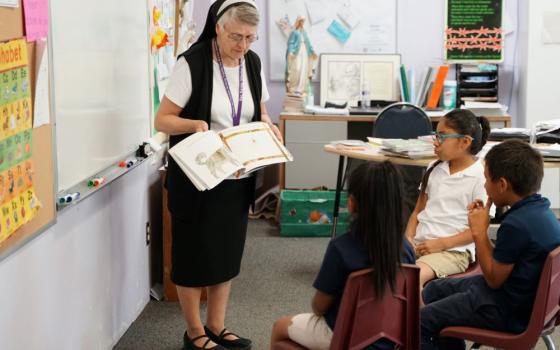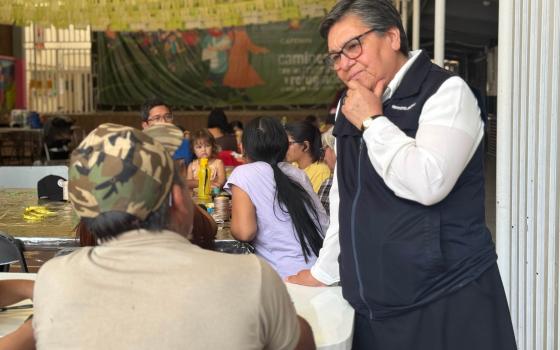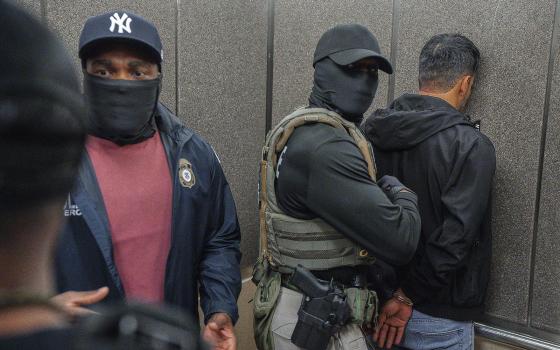Schoolchildren walk past an Afghan National Army soldier keeping watch at a checkpoint on the outskirts of Kabul, Afghanistan, April 21, 2021. (CNS/Reuters/Mohammad Ismail)
On the eve of the American military withdrawal from Afghanistan, those who pay attention to humanitarian developments are worried about a possible Taliban takeover of the country and what that means for women and girls.
As someone who first visited Afghanistan in 2001, 2002 and 2007 and witnessed the scale of humanitarian challenges, I am one of those worried — and so are Catholic sisters who advocate for women's and children's rights at the United Nations and other global forums.
The withdrawal of U.S. troops could threaten the small gains women and girls have made in the last 20 years, though those gains have been made in the face of continued violence and fierce determination by traditionalists to deny women any role in shaping Afghanistan's present or future.
But the worries are also bound up with the maddingly complex reality that is Afghanistan. Neither I nor the sisters I know are advocates for a military presence, and we are all aware that Afghanistan's history doesn't favor an occupying force staying in the country indefinitely. (The need to end a "forever war" is essentially the reason President Joe Biden has made the decision to withdraw U.S. forces by Sept. 11, the 20th anniversary of the 9/11 attacks in the United States.)
And yet, violence targeting girls, like a recent bombing at a girls' school in the capital of Kabul that killed more than 80 people, is real, shocking and dismaying.
In short, we're talking about a classic ethical quandary.
"There is no one good solution. It's a real critical problem," said Sr. Carol De Angelo, director of the Office of Peace, Justice and Integrity of Creation for the Sisters of Charity of New York who does advocacy work at the U.N.
"I am concerned about the people in Afghanistan who have supported the U.S. and, of course, I am very concerned about the gains that have been made for women that might disappear," De Angelo told me during a recent interview.
Advertisement
At the same time, she said, a continued outside military presence in Afghanistan just doesn't seem tenable.
"Violence begets violence," De Angelo said. "That's not building peace."
And let's be clear: Even if there is not a Taliban takeover, the Taliban — which controls large sections of the country — will continue to have outsize influence on the country. And even if there is not a war between the weak Afghan government and the Taliban, insecurity for women will continue and may get worse, observers say.
"All the time, women are the victims of men's wars," Raihana Azad, a member of Afghanistan's Parliament, recently told The New York Times. "But they will be the victims of their peace, too."
I know that to be true from experience: in my case, my three reporting assignments when I worked as a writer for the U.S.-based humanitarian agency Church World Service and reported for the ACT Alliance, a global humanitarian coalition. (During the last two assignments, I also freelanced for the National Catholic Reporter.)
The 2001 assignment, done in the summer before Sept. 11, was probably the most memorable. I traveled by car with Danish and Afghan colleagues across the country to report on a drought devastating the country, then under Taliban rule.
The world wasn't too concerned about the drought or much about Afghanistan in general that summer. But there was interest in the ways the ultraconservative Taliban — victors of a grim civil war that came about after the 1989 withdrawal of Soviet forces — were governing.
The Taliban had imposed strict regulations against women in public life. Women were forced to wear burqas in public, and we reporters were not allowed to interview them. (We did so, but only at night and at some risk for all of us, especially the women.)
Photography was forbidden, so my Danish colleague took photographs on the sly. And even things as simple as listening to music were banned. Our young Afghan driver took pride in showing us where he hid Bob Dylan cassette tapes in his headscarf.
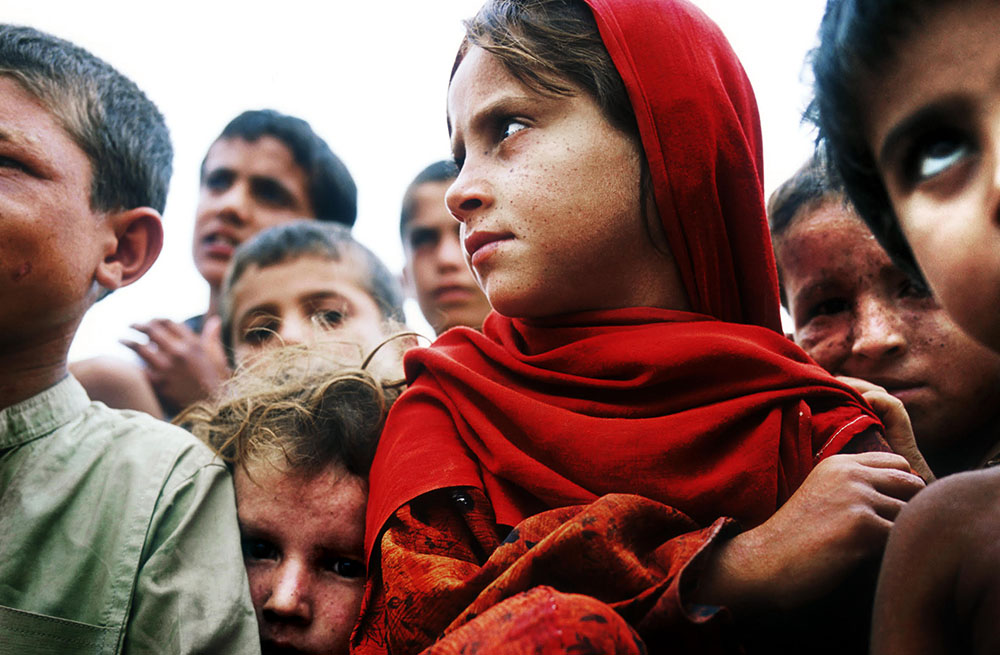
Children in Afghanistan in the summer of 2001, during a humanitarian assignment for the ACT Alliance (Courtesy of Nils Carstensen)
Most searing, though, were the impressions of Kabul as a decimated urban landscape, with entire city blocks reduced to rubble. We entered Kabul at dusk, and it seemed like a sadly haunted place, not at all like its onetime reputation as one of many cities claiming to be "the Paris of the East."
When I returned to Afghanistan 15 months later, after a U.S.-led war led to the fall of the Taliban, there were signs of some progress.
"The fall of the Taliban has opened up social space for Afghans, making the capital of Kabul a livelier and busier place. Shops are opening and homes are being reconstructed," I wrote for the ACT Alliance.
"In a glorious reversal of two of the more curious and bizarre Taliban strictures, children are once again flying kites and music is being played in public. A bit of buoyancy is in the air. Other social norms under the Taliban are also being relaxed: it is no longer necessary for a non-Afghan journalist to interview an Afghan woman under cover of night, for example."
Still, I noted that the country continued "to face a host of serious humanitarian and social problems."
The drought continued; poverty remained endemic, particularly in rural areas. Promised international assistance had not yet arrived, I noted.
"There may be more in the bazaar, but people still can't buy food," a Pakistani colleague told me.
And while girls had begun returning to school now that Taliban strictures had ended, disparities between the sexes continued, as did violence against women. Most women were still afraid of venturing out without wearing their burqas.
In a piece for NCR after my return from Afghanistan in 2007, I recalled an observation I made in 2002: "Civil society and central government remain fragile ... threatened by both a lack of strong international support and the continued strength of local warlords and religious fundamentalists."
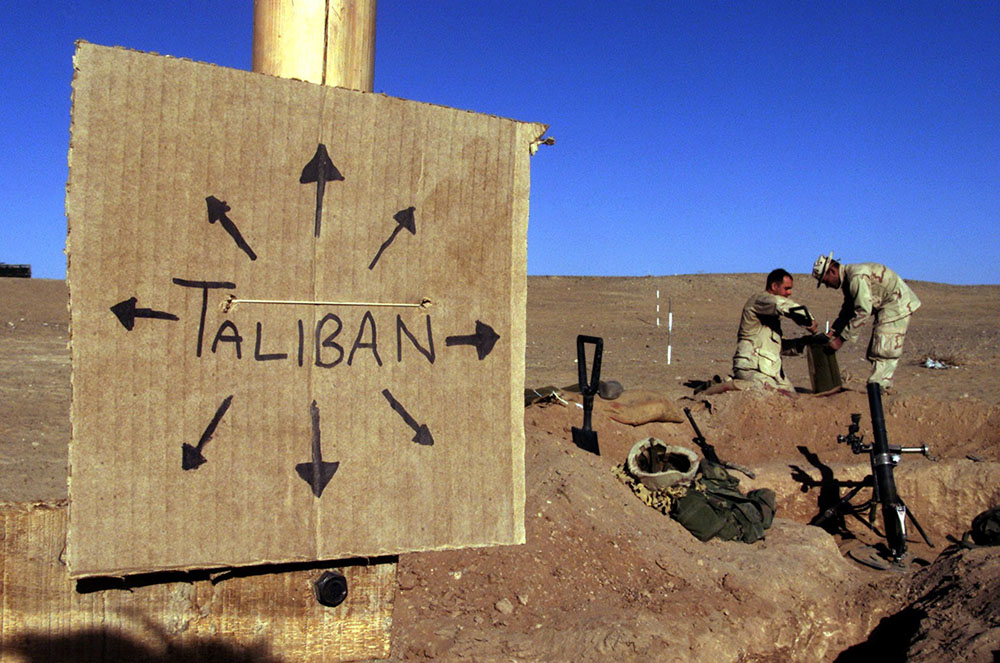
Marines from Charlie 1/1 of the 15th Marine Expeditionary Unit in southern Afghanistan fill sandbags around their light mortar position on the front lines of a Marine Corps base Dec. 1, 2001. (CNS/Reuters/Jim Hollander)
Unfortunately, I noted, that sentence worked as well in 2007 as it did in 2002. And it probably could be written now, in 2021, as could this 2007 observation: "Afghanistan's central government remains weak, and local warlords have, if anything, gained even more power since 2002."
Even then, it was clear that growing unhappiness about seemingly never-ending poverty, particularly in rural areas, was strengthening the Taliban's hand. Some argued that the Taliban was the cause of increased insecurity. But others argued, as I wrote in NCR, that Afghanistan's insecurity "is a byproduct of being caught in the cross hairs of the U.S.-led 'war on terror.' "
Some at the time said the United States and NATO forces were not welcome, noting that aerial bombings had cost too many civilian lives. Others said the outside military presence, particularly in Kabul, was the only tangible security people could depend on.
One telling and clarifying moment came during a 2007 meeting at a children's center in Kabul, when one mother "suddenly cut through the niceties of polite talk and bitterly declared, 'We hate this country and want to leave. There are no jobs here,' " I wrote for NCR.
"The outburst was striking," I wrote, "not only because such displays of raw emotion are, in my experience in Afghanistan, rare around foreign visitors. It also pointed to something I sensed from almost the beginning of my recent visit: growing economic inequality was becoming strikingly evident, at least in Kabul."
As I reflect on that 14 years later, I have the added experience of covering the United Nations, where Catholic sisters work with the passionate belief that security and peace are ultimately bound up in social protections, education and protecting the most vulnerable, not on military protections.
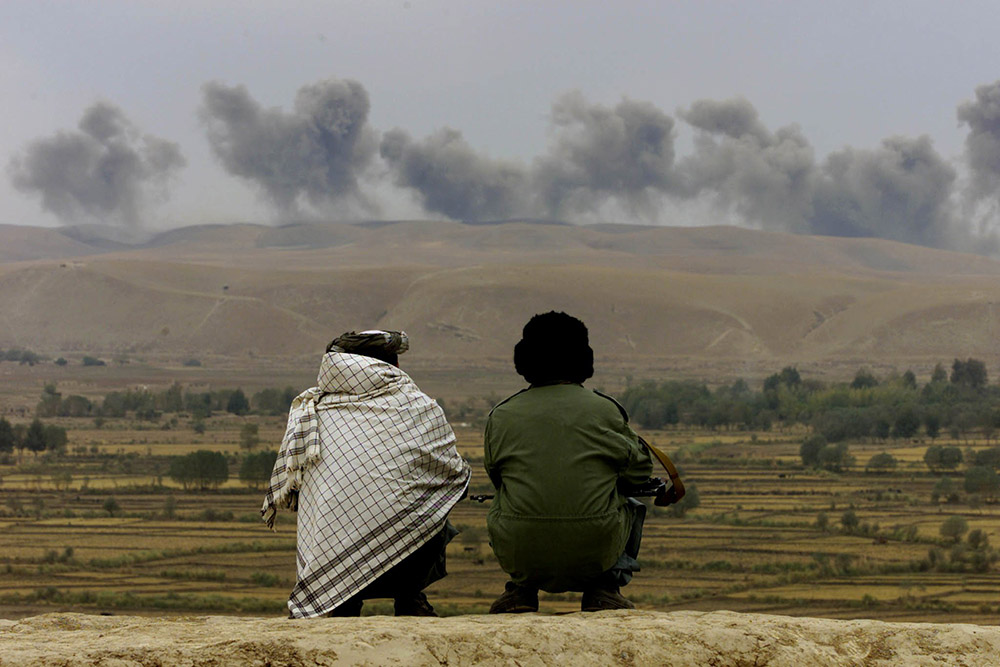
Two Northern Alliance soldiers near the village of Ai-Khanum in northern Afghanistan watch dust and smoke rise after explosions at Taliban positions Nov. 1, 2001. (CNS/Reuters/Vasily Fedosenko)
And, of course, they affirm the importance of women being present when important national and global decisions are being made. That was not the case during negotiations between the Trump administration and the Taliban that laid the groundwork for Biden's decision to end the U.S. military presence.
Sr. Winifred Doherty, who represents the Congregation of Our Lady of Charity of the Good Shepherd at the United Nations, said she sees the events of Afghanistan unfolding in a context of increased international indifference and even outright hostility to advances made by women.
"They will be in more jeopardy, certainly," Doherty said of Afghani women, "but is that surprising given the world position on the rights of women and girls right now?"
The concern was also raised at a March 19 side event during the meetings of the U.N.'s Commission on the Status of Women in which Adela Raz, Afghanistan's ambassador to the United Nations, said: "There is no future peace in Afghanistan without the constitutional protection and active promotion of women's rights."
"Peace gained at the cost of women's rights is not peace," said Melanne Verveer, the executive director of the Georgetown Institute for Women, Peace and Security, which sponsored the event. "We must stand with Afghan women who are critical to Afghanistan's future and any prospect for a durable peace."
Raz and Verveer are right: Peace without considering women is not peace anywhere. But it is sobering to think that after 20 years, the situation in Afghanistan remains so worrisome and fragile, and two decades of a U.S. military presence have not guaranteed security for many.
I wrote for NCR after the 2007 trip that the hope life in Afghanistan will improve "often hangs by a thread." Unfortunately, particularly when it comes to the fate of women and girls, it still does.

